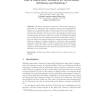Free Online Productivity Tools
i2Speak
i2Symbol
i2OCR
iTex2Img
iWeb2Print
iWeb2Shot
i2Type
iPdf2Split
iPdf2Merge
i2Bopomofo
i2Arabic
i2Style
i2Image
i2PDF
iLatex2Rtf
Sci2ools
250
click to vote
ICANN
2011
Springer
2011
Springer
Bias of Importance Measures for Multi-valued Attributes and Solutions
Attribute importance measures for supervised learning are important for improving both learning accuracy and interpretability. However, it is well-known there could be bias when the predictor attributes have different numbers of values. We propose two methods to solve the bias problem. One uses an out-of-bag sampling method called OOBForest and one, based on the new concept of a partial permutation test, is called pForest. The existing research has considered the bias problem only among irrelevant attributes and equally informative attributes, while we compare to existing methods in a situation where unequally informative attributes (with or without interactions) and irrelevant attributes co-exist. We observe that the existing methods are not always reliable for multi-valued predictors, while the proposed methods compare favorably in our experiments.
Related Content
| Added | 29 Aug 2011 |
| Updated | 29 Aug 2011 |
| Type | Journal |
| Year | 2011 |
| Where | ICANN |
| Authors | Houtao Deng, George C. Runger, Eugene Tuv |
Comments (0)

